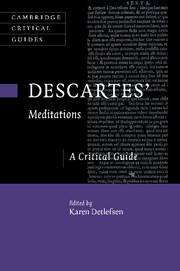Book contents
- Descartes’Meditations
- Series page
- Descartes’Meditations
- Copyright page
- Dedication
- Contents
- Contributors
- Acknowledgments
- Descartes’ texts
- Introduction
- Part I Skepticism
- Chapter 1 The skepticism of the First Meditation
- Chapter 2 Descartes and content skepticism
- Part II Substance and cause
- Part III Sensations
- Part IV The human being
- Bibliography
- Index
Chapter 1 - The skepticism of the First Meditation
from Part I - Skepticism
Published online by Cambridge University Press: 05 February 2013
- Descartes’Meditations
- Series page
- Descartes’Meditations
- Copyright page
- Dedication
- Contents
- Contributors
- Acknowledgments
- Descartes’ texts
- Introduction
- Part I Skepticism
- Chapter 1 The skepticism of the First Meditation
- Chapter 2 Descartes and content skepticism
- Part II Substance and cause
- Part III Sensations
- Part IV The human being
- Bibliography
- Index
Summary
- Type
- Chapter
- Information
- Descartes' MeditationsA Critical Guide, pp. 9 - 24Publisher: Cambridge University PressPrint publication year: 2012
- 1
- Cited by



